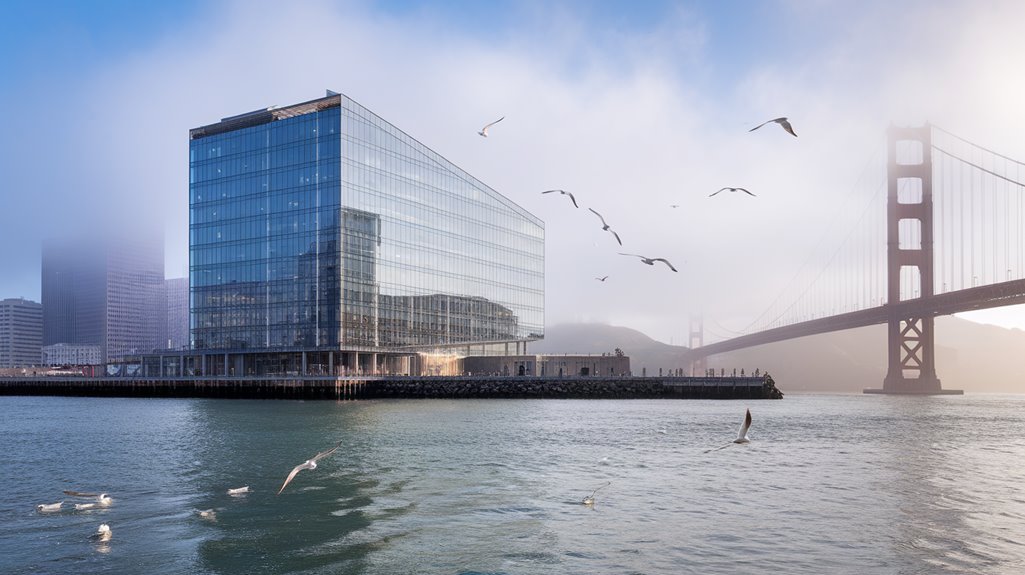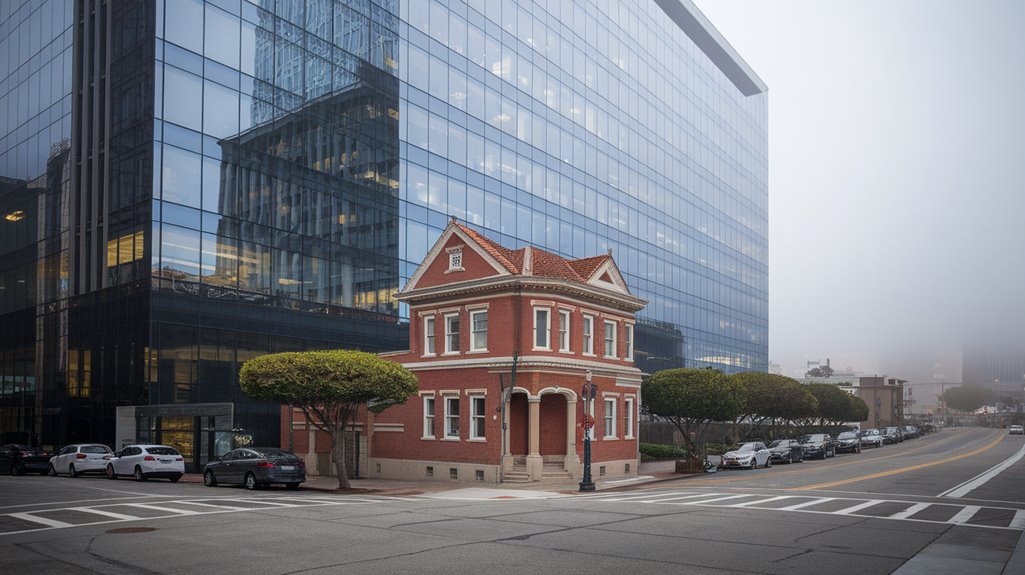The Bay Area legal market offers strong career opportunities with 7.2% revenue growth and increasing tech-focused roles. Attorneys can expect starting salaries above $160,000 at large firms, with hybrid work arrangements becoming standard. The region demands expertise in AI, cloud computing, and software licensing. While high living costs pose challenges, the market shows consistent growth, especially in fintech and cannabis law. A deeper exploration reveals valuable strategies for career success in this dynamic environment.
Key Takeaways
- Strong market growth and competition among AmLaw firms create abundant opportunities, with 17 new offices opening in California during 2024.
- Starting salaries exceed $160,000 at large firms, with total compensation packages emphasizing both monetary and lifestyle benefits.
- Hybrid work models dominate, typically requiring two office days weekly, with firms supporting remote work through technology and ergonomic resources.
- Technical expertise in AI, cloud computing, and software licensing leads to higher compensation and expanded career opportunities.
- Cost-of-living challenges require strategic financial planning, with housing consuming 30-40% of income in major California cities.
Current State of Bay Area Legal Market

The Bay Area legal market continues to thrive, with law firms leading US revenue growth at 7.2% in 2017 and reaching 11.9% in the first nine months of 2024. Legal market dynamics show strong expansion, with 17 new AmLaw200 firm offices opening in California throughout 2024.
Competition analysis reveals over 70 AmLaw100 firms vying for talent in the region, with a notable shift from antitrust defense to deal-focused hiring. The market remains anchored by tech-driven demands, particularly in M&A, regulatory compliance, and cross-border transactions. Mid-sized firms are gaining ground as cost-conscious clients seek smaller-scale expertise. While economic uncertainty persists, the hiring climate remains steady, with firms adapting to hybrid work models and emphasizing competitive compensation packages to attract and retain top talent.
Tech-Focused IP Law Opportunities
Bay Area's tech-focused IP law opportunities have exploded alongside the region's dominance in software and innovation. Current IP law trends show high demand for attorneys who understand AI, cloud computing, and software licensing. Law firms increasingly seek professionals with both legal expertise and technical knowledge, especially for startup compliance and international transactions.
Tech legal talent is in high demand as Bay Area firms seek attorneys who can bridge the gap between innovation and compliance.
- Tech-focused boutique firms offer specialized services in AI, cloud computing, and digital rights protection
- Large corporations seek IP attorneys for compliance, patent prosecution, and trademark protection
- Firms value professionals with technical backgrounds in science and engineering
The region's emphasis on data security and privacy has created new opportunities for IP lawyers who can navigate California's strict regulations while managing global IP strategies. Many firms now offer flexible billing models to accommodate both established companies and emerging startups.
Salary Expectations and Compensation Trends

Three key factors drive legal salaries in the Bay Area to consistently outpace national averages: high living costs, strong demand for specialized services, and fierce competition among firms. While the national average lawyer wage sits at $176,470, Bay Area compensation often exceeds this substantially, especially in tech-focused practices.
For 2025, salary negotiation strategies should account for projected raises averaging 3.5%, down from 4% in 2023. Smart candidates focus on total compensation package components beyond base pay, including flexible work options and enhanced benefits. Despite economic uncertainty, firms continue investing in tech-savvy legal talent, particularly in intellectual property and technology law. New lawyers entering the market can expect starting salaries above $160,000 at large firms, though automation may impact entry-level opportunities.
Work-Life Balance in Bay Area Law Firms
Bay Area law firms stand out for offering more flexible work arrangements than the national average, with most allowing hybrid schedules and remote options. Local firms typically set billable hour targets between 1,600-1,800 annually, compared to the 2,000-hour national standard, making work-life balance more achievable. Practice areas like corporate law tend to have higher hourly demands than public interest or government roles, though firms increasingly offer alternative scheduling to retain talent.
Remote Work Vs Hours
How dramatically has remote work transformed the legal landscape in the Bay Area? The shift shows in the numbers – while only 24% of leaders and 25% of associates worked remotely before the pandemic, now just 22% of leaders have returned full-time to offices. This change brings both opportunities and challenges for workload management techniques and remote collaboration strategies.
Bay Area attorneys face demanding schedules, averaging 2,200 billable hours annually. Firms are adapting by:
- Implementing flexible schedules and hybrid arrangements to reduce commute time
- Using legal software to streamline routine tasks and improve efficiency
- Offering ergonomic home office support and tech tools for remote work
These adaptations help balance the high billable requirements while maintaining productivity and employee satisfaction in the new work environment.
Hourly Demands By Practice
Legal practice areas in the Bay Area show distinct patterns in both billing rates and work demands. An hourly rate comparison reveals tax law commanding the highest rates at $502 per hour, closely followed by corporate and intellectual property practices at $450-$502. Real estate and bankruptcy attorneys typically bill between $434-$492 hourly in the region's high-cost market.
Practice area trends indicate that litigation and appellate work, while averaging lower rates of $369-$428 per hour, often involve unpredictable schedules based on case complexity. The pressure to meet billable targets remains high across all specialties, with firms maintaining 78.1% weekly office occupancy. While some boutique firms offer more flexible pricing models, they still face market pressure to keep competitive rates. Firms like Latham & Watkins try to offset demanding hours with workplace wellness amenities.
Remote Work Policies and Flexibility

Firms across the Bay Area are rapidly adapting their remote work policies to meet changing workforce demands. California law requires employers to cover necessary remote work expenses, including home office setups and technology costs. Many firms now offer flexible arrangements that combine in-office and remote days to maximize productivity while maintaining work-life balance.
Key benefits of remote work flexibility include:
- Lower operational costs through reduced office space
- Access to broader talent pools beyond geographic limits
- Improved retention rates, especially among diverse candidates
To support remote work success, firms implement secure technology systems, clear communication protocols, and structured supervision processes. They also provide reimbursement policies that cover essential equipment and home office expenses. This shift toward flexibility helps Bay Area firms stay competitive while meeting evolving professional needs.
Career Paths for Patent Attorneys
Patent attorneys in the Bay Area typically choose between prosecution work, which involves filing and managing patent applications, or litigation roles focused on infringement cases and disputes. Those with deep technical backgrounds in software, AI, or biotech often find more opportunities and higher compensation, particularly at major tech companies and specialized law firms. The choice between prosecution and litigation paths usually happens early in one's career, with each track requiring different skillsets and leading to distinct partnership opportunities.
Patent Prosecution vs. Litigation
Bay Area attorneys pursuing intellectual property careers face a pivotal choice between patent prosecution and patent litigation paths. These distinct tracks require different skills and lifestyles, with prosecution focusing on USPTO filings and direct inventor collaboration, while litigation involves courtroom advocacy and case strategy.
- Prosecution strategies emphasize technical expertise and USPTO registration, ideal for attorneys who prefer steady hours and detailed patent drafting
- Litigation tactics demand strong trial skills and procedural knowledge, suited for those comfortable with unpredictable schedules and travel
- Both paths offer competitive compensation, though litigation often provides higher bonuses through contingency fees
The choice often depends on personal work style preferences, as prosecutors typically enjoy stable office environments while litigators thrive in high-pressure courtroom settings. Technical backgrounds benefit both tracks but are especially essential for prosecution work in biotech and pharmaceutical sectors.
Tech Specialization Benefits
Technical specialization offers patent attorneys in Silicon Valley numerous advantages for career growth and earning potential. With backgrounds in engineering and computer science, these lawyers can better understand complex tech innovations and provide targeted guidance to clients. Their expertise enables them to craft stronger patent strategies and respond effectively to USPTO office actions.
Attorneys who focus on specific technologies like AI, blockchain, or biotech can build valuable reputations in these high-demand sectors. Their deep technical knowledge helps them collaborate effectively with R&D teams and anticipate future developments in their chosen fields. This specialization often leads to leadership roles, especially in firms where IP is central to business strategy. Professional certifications further enhance their credibility and open doors to senior positions focused on litigation management and strategic client advisory services.
Boutique Firm vs. Big Law Considerations

When choosing between boutique firms and Big Law in the Bay Area, lawyers must weigh several key factors that impact their career trajectory. Boutique firms offer more direct client interaction, lower billable hours, and faster paths to partnership, which often leads to higher career satisfaction. Meanwhile, Big Law provides structured training, higher starting salaries, and exposure to complex cases, though often with intense workloads and rigid firm culture.
- Boutique firms typically maintain under 20 employees and focus on 1-2 legal specialties
- Big Law associates face 2,000+ annual billable hours vs. 400-600 in boutiques
- First-year Big Law salaries reach $190k-$215k in the Bay Area, though boutiques offer quicker partnership opportunities
The choice ultimately depends on individual priorities regarding work-life balance, compensation, and professional development goals.
Essential Skills for Tech-Focused Legal Roles
Modern legal roles in Silicon Valley demand a unique blend of traditional law expertise and tech competency. Today's attorneys need skills in data visualization, predictive analytics, and AI tools for efficient legal research and contract automation. Understanding cybersecurity protocols and incident response has become essential for protecting client data.
| Essential Tech Skills | Impact on Legal Work |
|---|---|
| Blockchain & Smart Contracts | Digital evidence preservation |
| AI/ML Tools | Contract automation & risk assessment |
| Data Analytics | Workflow optimization & anomaly detection |
Successful tech lawyers must master project management platforms while staying current with compliance standards. Many firms now require specific certification programs in areas like cybersecurity and blockchain applications. The integration of these technical skills with legal expertise creates more efficient, data-driven legal services that meet Silicon Valley's unique demands.
Breaking Into the Silicon Valley Legal Scene
Breaking into Silicon Valley's legal scene requires looking beyond traditional law firm paths, as smaller boutique firms offer valuable entry points with their specialized IP practices. The region's limited number of large firms, with only two having over 200 attorneys, makes competition fierce for conventional positions. Smart candidates connect through tech-focused events like IP Law Dinners and AI Legal Hackathons while targeting boutique firms that specialize in emerging technology sectors.
Network Beyond Law Firms
While traditional law firms remain important employers, aspiring legal professionals in Silicon Valley must look beyond them to find promising opportunities. Networking strategies should include joining legal operations communities like TELUS and active participation in professional associations focused on emerging sectors.
The tech ecosystem offers diverse paths for legal careers beyond conventional practice:
- Legal operations roles combining technology expertise with business intelligence and project management
- In-house positions at startups and tech companies requiring specialized knowledge in areas like data privacy and environmental compliance
- Nonprofit organizations needing expertise in tech transactions and regulatory compliance
These opportunities often require different skill sets than traditional law practice, including software proficiency, financial management experience, and understanding of specific industries like life sciences or venture capital.
Target Boutique IP Practices
Boutique intellectual property (IP) law firms represent a compelling entry point for legal professionals in Silicon Valley. These specialized firms offer distinct boutique advantages, including focused expertise in tech-heavy sectors and closer client relationships. Their lean structure allows for innovative IP strategies and flexible fee arrangements that appeal to startups and established companies alike.
| Key Focus Areas | Required Skills | Career Benefits |
|---|---|---|
| Patent Strategy | Technical Degree | Direct Client Work |
| Trade Secrets | USPTO Experience | Industry Expertise |
| Portfolio Management | Global IP Knowledge | Flexible Culture |
Success in boutique IP practices often hinges on combining legal expertise with technical knowledge. Many attorneys hold advanced degrees in engineering or sciences, enabling them to bridge the gap between innovation and legal protection. These firms particularly value professionals who can communicate complex IP concepts clearly to clients while staying current with evolving technologies.
Lateral Movement and Partnership Tracks
As legal professionals navigate their careers in the Bay Area, lateral movement between firms offers both opportunities and challenges. Recent lateral recruitment strategies emphasize specialized skills in AI, privacy, and emerging tech sectors. Partnership advancement metrics vary by firm, with Midwest options offering faster paths to partnership compared to coastal markets.
Key factors influencing lateral moves in the Bay Area include:
Lateral legal talent in the Bay Area flows based on competitive compensation, flexible work options, and growing demand for tech-focused expertise.
- Salary ranges of $180k-$225k with extensive benefits packages
- Hybrid/remote work arrangements reducing geographic barriers
- Focus on specialized practice areas like AI and influencer law
The 2023 market shows stabilization after post-pandemic volatility, with firms prioritizing both technical expertise and client development skills. Partnership tracks typically require 3-7 years of post-J.D. experience, while boutique firms often value Law Review credentials and niche specializations.
Paralegal Career Growth and Demands

Bay Area paralegals earn industry-leading salaries, with median compensation reaching $68,800 annually and potential bonuses of 5-15% in corporate settings. Remote work flexibility has increased across legal practices, though firms still expect proficiency in digital tools like WestlawNext and Kira for document management. Career advancement increasingly depends on automation skills, with tech-savvy paralegals commanding higher salaries and better opportunities in corporate legal departments and legaltech startups.
Salary Trends and Projections
Paralegal careers in the Bay Area continue to offer some of the highest salaries nationwide, with professionals earning a median annual income of $75,140 in California. Top performers in tech-heavy regions like San Jose and San Francisco earn over $117,120 annually, making salary negotiation essential for maximizing compensation packages. The region's high cost of living and strong demand from tech companies drive these premium wages.
Key salary highlights in the Bay Area:
- Napa leads nationwide with average salaries of $93,110
- San Jose offers top-tier pay at $90,280 average
- Corporate legal departments provide the best growth potential
Experience and specialization greatly impact earnings, with tech-focused paralegals commanding higher pay. The job market shows steady growth at 4.2% through 2032, particularly in emerging sectors like fintech and cannabis law.
Remote Work Opportunities Expand
Remote work has transformed the legal industry across the Bay Area, with over 189 virtual positions posted in early 2025. This shift reflects growing remote job trends, particularly for attorneys and paralegals seeking flexible work arrangements. Law firms now commonly offer hybrid schedules, typically requiring two days in office and three days remote, especially in litigation and employee rights practices.
Legal tech advancements play an essential role in this change, as employers prioritize candidates skilled in document automation and cloud-based case management tools. While fully remote positions demand California bar licenses for litigation attorneys, they offer competitive compensation, ranging from $100,000 to $200,000 for senior counsel roles. Mid-level paralegals can expect salaries between $60,000 and $80,000, with opportunities increasing as firms embrace virtual work environments.
Automation Skills Drive Advancement
Sweeping changes in legal automation have transformed paralegal roles across the Bay Area, with AI-powered tools reducing routine tasks by 40%. While automation challenges include maintaining compliance and data security, automation benefits are clear: faster document processing, improved accuracy, and enhanced client service. The rise of cloud-based systems and AI platforms has made technical proficiency essential for career advancement.
Key automation skills driving career growth:
- Mastery of AI tools like ChatGPT4 for drafting and research
- Proficiency in cloud-based case management systems like Clio and MyCase
- Expertise in e-discovery and document automation platforms
With legal tech investment exceeding $1.2B in 2024, paralegals who embrace these technological changes position themselves for advancement in an evolving industry that increasingly values both technical and analytical skills.
Cost of Living Impact on Legal Careers

While lawyers in major California cities command impressive salaries, the high cost of living greatly diminishes their actual purchasing power. San Francisco attorneys earning $165,000 annually see 30-40% of their income consumed by housing challenges and transportation expenses. Even in Los Angeles, where salaries reach $160,000, cost considerations remain notable compared to emerging markets like San Diego.
The impact is particularly severe for legal aid attorneys, who earn substantially less than their private sector counterparts. With hourly rates showing dramatic disparities – $323 for private lawyers versus $37 for legal aid attorneys – many public interest lawyers depend on spousal income to maintain their careers. The COLU ratios highlight this disparity, with San Francisco (147.6) and Los Angeles (128.4) demonstrating markedly higher living costs than other legal markets.
VC-Backed Client Relationship Management
Bay Area legal professionals seeking higher earning potential often gravitate toward venture capital law, where firms compete intensely for top startup clients. Leading firms like Cooley, Wilson Sonsini, and Gunderson Dettmer focus heavily on client engagement through specialized industry expertise and relationship building initiatives.
- Cooley ranks first in emerging companies, offering tech startups thorough lifecycle guidance
- Wilson Sonsini excels in life sciences partnerships while maintaining flexible work arrangements
- Latham & Watkins specializes in fintech deals and cross-border transactions
Success in VC law requires more than just technical expertise. Firms invest in community engagement through pro bono work and social events, helping attorneys align with startup culture. This approach creates lasting partnerships, particularly in tech and life sciences sectors where understanding client needs is essential for long-term success.
Legal Technology and Innovation Requirements

As legal practices evolve in Silicon Valley, technology expertise has become essential for attorneys at all levels. Legal tech trends show AI automation and blockchain applications are reshaping how lawyers conduct research, manage contracts, and predict case outcomes. Firms increasingly seek professionals who can navigate cloud platforms while addressing cybersecurity concerns.
Recent regulatory changes, particularly in California, have opened doors for non-lawyer owned firms and tech-law partnerships. Innovation challenges include adapting to new career roles like Legal AI analysts and blockchain contract managers, which command competitive salaries in the Bay Area market. Data privacy specialists are particularly sought after due to compliance requirements. Law firms now expect attorneys to understand both traditional legal practice and emerging technologies, creating opportunities for tech-savvy legal professionals.
Frequently Asked Questions
How Do Bay Area Firms Handle Pro Bono Requirements for First-Year Associates?
Bay Area firms take a flexible approach to pro bono policies for first-year associates. While most firms encourage participation, they typically don't mandate specific hour requirements. Associate expectations vary by firm, with some offering structured programs and others allowing voluntary engagement. Firms often provide billable hour credit for pro bono work and pair new associates with senior attorneys for mentorship. This helps first-years balance pro bono commitments with their regular workload.
What Networking Groups Specifically Cater to Women Attorneys in Silicon Valley?
Silicon Valley offers several dedicated groups for women lawyers to build their professional networks. The Women in Law Committee at APABA Silicon Valley hosts monthly networking events and mentorship programs focused on Asian American female attorneys. The Bay Area Women Lawyers' Network organizes annual retreats, while ProVisors' Women's Affinity Group facilitates monthly meetings in San Jose. The SMCBA Women Attorneys Network provides professional development opportunities through judge-practitioner connections and cross-practice collaborations.
Are Immigration Law Skills Valuable for Tech-Focused Legal Positions?
Immigration law skills are increasingly valuable for tech-focused legal positions. Many tech startups deal with international talent recruitment and visa processes for their employees. Current immigration trends show that tech companies regularly need legal expertise for hiring foreign workers, managing visa applications, and ensuring compliance. Legal professionals who understand both immigration law and tech industry needs are particularly sought after, especially in startup environments needing versatile counsel.
Which Bay Area Neighborhoods Offer the Best School Districts for Lawyer Families?
Lawyer families often choose Palo Alto and Menlo Park neighborhoods for their excellent schools and strong legal communities. These areas offer top-rated public school districts with strong special education programs and low student-teacher ratios. The proximity to tech companies and law firms is a bonus for working parents. Local schools in these communities consistently rank among California's best, making them ideal for families who prioritize education.
How Do International Law Firms Integrate With Local Silicon Valley Startup Culture?
International law firms have found innovative ways to blend into Silicon Valley's unique ecosystem. Through cross cultural collaboration, they adopt startup-style workflows like daily standups and agile project management. Legal tech integration plays a key role, with firms using AI tools and digital platforms that mirror their tech clients' approaches. They also embed lawyers directly in startups through secondment programs and partner with local incubators to build authentic connections with the community.
Conclusion
The Bay Area legal landscape flows like the region's famous fog – constantly shifting but always present. A junior associate who started at $190,000 in 2020 now commands $225,000+ in 2024, reflecting the market's upward momentum. Success here requires adapting to tech-driven changes while maintaining work-life boundaries. Like the Golden Gate Bridge, legal careers here connect traditional practice with innovation, standing strong amid changing conditions.
